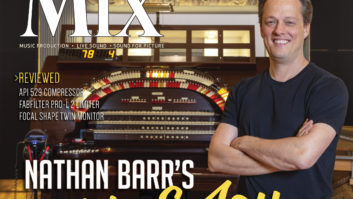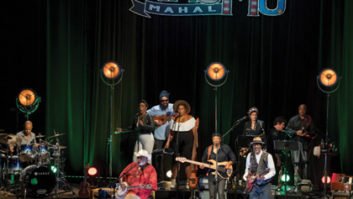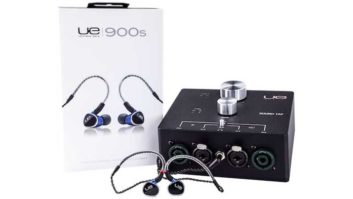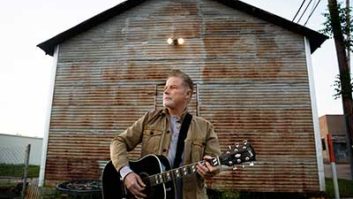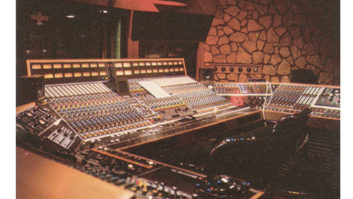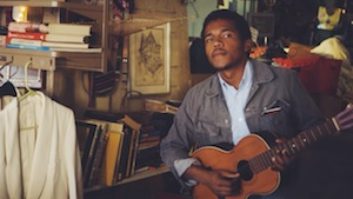by Christopher Walsh.

Nashville, TN–In a move that both gathers disparate assets and manifests the brand in a new market, the Norbert Putnam-designed Studio D from House of Blues Studios in Memphis will soon move, via flatbed truck, to the Berry Hill neighborhood of Nashville. There, it will be joined with the former East Iris Studios complex, which has been renamed House of Blues Studios, Nashville. Studio D, which hosted legendary artists including Memphis legends Pops Staples and Isaac Hayes, features a tracking room and four iso booths, a control room, kitchen and lounge.
Concurrently, the 44-channel vintage API console from House of Blues Studios in Encino, CA is moving to Studio D at its new location in Nashville. The console features vintage 550A EQs, 24 busses and inline monitoring–providing a total of 88 inputs–based around the 2520 op amp.
Upon completion, House of Blues Nashville will be comprised of five studios: the existing Tom Hidley-designed SSL 9000-equipped Studio A and SSL 4000 E Series-equipped Studio B; Studio C, a Pro Tools|HD overdub/mix suite situated in a recently acquired building across the street; the aforementioned Studio D; and another newly constructed Pro Tools/writers suite. (Also onsite are the personal studios of engineers Mitch Dane and Vance Powell.)
House of Blues is among the top brands in entertainment, with 13 live-performance and dining venues across the U.S. and studios in the three aforementioned cities.
Belz, formerly partnered with Allen Sides in Nashville’s Ocean Way Studios, is excited about the convergence occurring in Berry Hill. “We’re doing what we believe in,” says Belz. “We have faith and are taking this giant step in moving a part of Memphis history to Nashville. I have great faith that we’re laying fertile ground for new things. We’re creating the type of spaces in these new studios that will attract and develop the next generation of songwriters, engineers and producers, while we continue with the established ones we are so fortunate to have.”
“Even within the commercial music areas,” House of Blues Nashville studio manager Mike Paragone allows, “there were markets we were missing. I’d get a call for ‘I just want to do a vocal overdub, I don’t need a console or all this outboard gear. I need a room, a computer, a microphone, a good mic pre.’ We just couldn’t provide that within what we had. The main objective of bringing these new facilities online is covering all our bases.”
“We are thinking about trying to go after voiceover, advertising, post production, television, and other media in some of these new rooms,” Belz summarizes. This strategy reflects the changed nature of the commercial recording business, in which new-media projects are in demand alongside traditional album-recording sessions, while independent labels and artists assume a greater percentage of HOB Studios’ music-recording projects.
Studio C’s grand opening took place on May 18. A control surface and summing solution for the suite are to be determined, says Paragone; gear from House of Blues Nashville’s vast inventory is available to Studio C clients on an as-needed, per-session basis.
Meanwhile, Belz reports a surprisingly robust schedule at HOB Studios in Encino, including mixing sessions for music from the original Woodstock festival with producer/engineer Eddie Kramer, and album projects by Yusuf Islam (formerly known as Cat Stevens) and Joe Walsh.
“All our studios reflect what we have learned and clients have shared with us–the producers, the engineers, the musicians, the artists,” says Belz. “That’s how I have gotten better. We’re only as good as our clients have allowed us to become, and I believe we have become a world-class organization because of the great clients that we have had over the many years now, in our various studios.”
“From my point of view,” adds Paragone, “if I didn’t have my staff–and the team of interns, even–half the stuff we have going on here wouldn’t get done. It’s definitely a team effort.”
Belz also praises former chief tech Sal Greco, who served in that role at Ocean Way when Belz was co-owner and remains with its present owner, Belmont University. “Without Sal, I could not have done Ocean Way Nashville,” he confides. “Without Sal, I could never have continued to improve. Sal is like a guru in his own right.”
In addition to staff and clients, Belz credits Sri Sathya Sai Baba, to whom he and business partner Isaac Tigrett have been devoted for many years. Belz often travels to India, where the International Sai Organization is based, and he and Tigrett are involved with its charitable works there. “He inspires us,” says Belz, “and I have great faith and trust in him that he lets me only do the right thing.
“By building these new types of rooms, with the name change, the collaboration and this new marketing approach,” Belz concludes, “I think we have a very rosy future.”
House of Blues Studios
www.houseofbluesstudios.com

